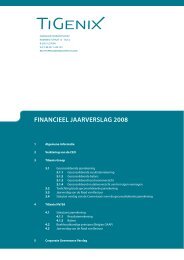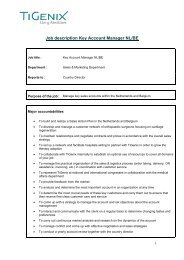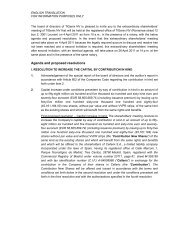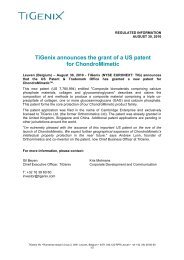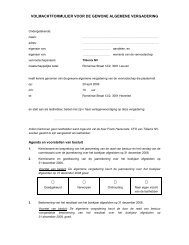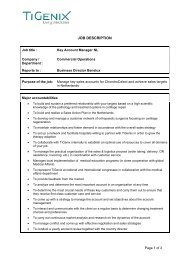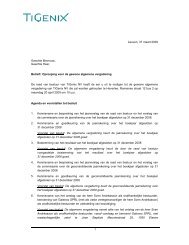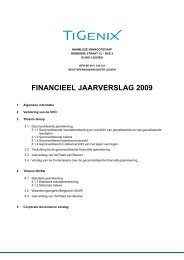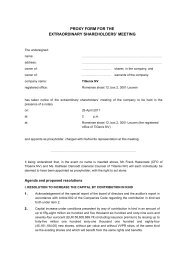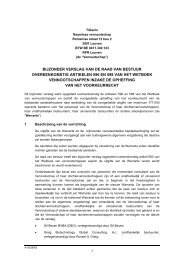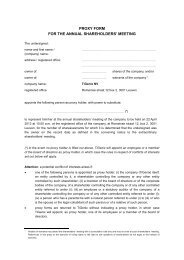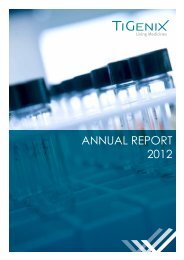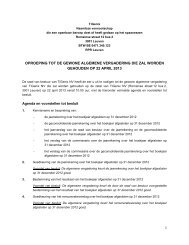ANNUAL FINANCIAL REPORT 2010 2010 - TiGenix
ANNUAL FINANCIAL REPORT 2010 2010 - TiGenix
ANNUAL FINANCIAL REPORT 2010 2010 - TiGenix
- No tags were found...
You also want an ePaper? Increase the reach of your titles
YUMPU automatically turns print PDFs into web optimized ePapers that Google loves.
in writing provided that the Company receives the writtenquestion at the latest on the sixth (6th) day preceding the dayon which the shareholders’ meeting is held.Quorum and majoritiesIn general, there is no quorum requirement for a shareholders’meeting and decisions are generally passed with a simplemajority of the votes of the Shares present and represented.Capital increases not decided by the Board of Directors withinthe framework of the authorised capital, decisions with respectto the Company’s dissolution, mergers, de-mergers andcertain other reorganisations of the Company, amendmentsto the Articles of Association (other than an amendment ofthe corporate purpose), and certain other matters referredto in the Companies Code do not only require the presenceor representation of at least 50% of the share capital of theCompany but also the approval of at least 75% of the votescast. An amendment of the Company’s corporate purpose,requires the approval of at least 80% of the votes cast at ashareholders’ meeting, which in principle can only validlypass such resolution if at least 50% of the share capital of theCompany and at least 50% of the profit certificates, if any,are present or represented. In the event where the requiredquorum is not present or represented at the first meeting, asecond meeting needs to be convened through a new notice.The second shareholders’ meeting can validly deliberate anddecide regardless of the number of Shares and profit certificatespresent or represented.2.5.3 DividendsAll Shares participate in the same manner in the Company’sprofits (if any). The Contribution Shares and the New Shareswill participate in the results in the same way as existingShares. Pursuant to the Companies Code, the Shareholderscan in principle decide on the distribution of profits with asimple majority vote at the occasion of the annual generalshareholders’ meeting, based on the most recent statutoryaudited annual accounts, prepared in accordance with thegenerally accepted accounting principles in Belgium and basedon a (non-binding) proposal of the Board of Directors. TheArticles of Association also authorise the Board of Directors todeclare interim dividends subject to the terms and conditionsof the Companies Code.Dividends can only be distributed if following the declarationand issuance of the dividends the amount of the Company’snet assets on the date of the closing of the last financial yearaccording to the statutory annual accounts (i.e., the amountof the assets as shown in the balance sheet, decreased withprovisions and liabilities, all as prepared in accordance withBelgian accounting rules), decreased with the non-amortisedcosts of incorporation and expansion and the non-amortisedcosts for research and development, does not fall below theamount of the paid-up capital (or, if higher, the called capital),increased with the amount of non-distributable reserves. Inaddition, prior to distributing dividends, 5% of the net profitsmust be allotted to a legal reserve, until the legal reserveamounts to 10% of the share capital.The right to payment of dividends expires five years after theBoard of Directors declared the dividend payable.2.5.4 Rights regarding dissolution andliquidationThe Company can only be dissolved by a Shareholders’resolution passed with a majority of at least 75% of the votescast at an extraordinary general shareholders’ meeting whereat least 50% of the share capital is present or represented. In theevent the required quorum is not present or represented at thefirst meeting, a second meeting needs to be convened througha new notice. The second shareholders’ meeting can validlydeliberate and decide regardless of the number of Sharespresent or represented.If as a result of losses incurred the ratio of the Company’sstatutory net-assets (determined in accordance withBelgian legal and accounting rules) to share capital is lessthan 50%, the Board of Directors must convene a specialshareholders’ meeting within two months as of the date theBoard of Directors discovered or should have discovered thisundercapitalisation. At this shareholders’ meeting the Boardof Directors needs to propose either the dissolution of theCompany or the continuation of the Company, in which casethe Board of Directors must propose measures to redress theCompany’s financial situation. Shareholders representing atleast 75% of the votes validly cast at this meeting have theright to dissolve the Company, provided that at least 50% ofthe Company’s share capital is present or represented at themeeting. In the event the required quorum is not present orrepresented at the first meeting, a second meeting needs tobe convened through a new notice. The second shareholders’meeting can validly deliberate and decide regardless of thenumber of Shares present or represented. If as a result of lossesincurred the ratio of the Company’s net assets to share capitalis less than 25%, the same procedure must be followed, itbeing understood, however, that the dissolution only requiresthe approval of Shareholders representing 25% of the votes47 •



